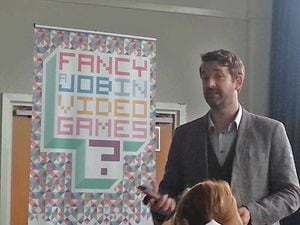BAFTA Young Games Developers Initiative - Why this is a step forward for gaming
When I was in my teens, fickle thing that I was, I changed my mind so much about what I wanted my career to be.

Now, I made some pretty out there decisions. There was one stage when I wanted to be a massage therapist, and another when I thought hairdressing would be really fun, but generally I switched between three things; gaming, writing, and music. 'But these are just hobbies!' people would scream, dramatically waving their arms about in frustration (my memories may be ...slightly exaggerated) 'You need something to fall back on. Sure, you can do these in your spare time, but for college, why don't you do *insert popular subject I was not remotely interested in here*?'
There I was, not knowing what I wanted to do, or so I thought. Well I did know what I wanted to do, but guidance counsellors, teachers, and the like, saw my dreams and passions as fanciful ideas, and instead told me that in order to succeed in life you had to get your head down and concentrate on becoming a paramedic, or a librarian, or a vet. Now, there are some who would make excellent vets and this may be their dream job, but it isn't mine, nor has it ever been.
As a result of my indecision, I ended up in college studying a subject that had interested me for precisely two seconds and then hatedfor the rest of the course. I got a diploma in something I knew I would never really need again, except for bragging rights that I am able to give a bloody good massage.
Again I had ignored instincts that looking back, were the equivalent of a pen and paper blowing a foghorn in my ear. I had written for the school paper, and after finishing school I had secured a temporary, paid job writing for a small paper. I had come home early from my holiday to attend the interview. I was over the moon when I got it. And then I left for college to study sports therapy.
My complete lack of interest in the subject meant I promptly stopped looking for jobs right after my first rejection, and stayed in my part-time bakery job while in my own time chasing my other passion, music, forming bands and DJing with a certain amount of success, but not quite enough to be able to depend on it as a sole means of income.
Another avenue of writing I had always been interested in was games journalism. I had always been a huge gamer - as most people in this industry are - and read all of the gaming magazines. Growing up I remember looking at the articles and columnists, and thinking: "That is the coolest job ever. I need to do that one day."
I also had passing thoughts about how amazing it would be to make my own game. One of the magazines I read had a section where you could send your own ideas in, with characters, plot, maybe some level design... and win a prize if your idea was deemed the best. It was my favourite section while it was running. Though other than this, I had no idea where to start.
Games have been huge for a while, there's no doubt, but the world has taken a while to start opening its eyes to the fact. When I asked around about how to get into making a game, I would hear about how it's all a lot more boring than it looks, just endless coding and learning a million computer languages. Best to forget about it, Jo. Just enjoy playing the games and don't give yourself a headache over it. I wondered if there was some section I could contribute to; something that I could give that I was good at, such as writing the script, getting involved in the music side... something like that. I never found out. The answers were vague, and eventually I stopped asking and pursued the journalism side of games, and I'm happy with that.
There are some, though, who have more heart for it than I. Of course, as long as there have been games, there have been people who have managed to make them, but it's always nice when these subjects get a little bit easier to access and understand. The BAFTA Young Games Designers Initiative started in 2010 as a games design competition for 11-16-year-olds, and since then has become more of a careers advisory, open to 10-18 year olds who have an active interest in video games. Can you imagine having this kind of behind the scene opportunity?

It certainly sounds a bit more exciting and a lot less vague. I attended the launch of the 2014-15 programme on Thursday, September 27 at Eurogamer and it was great to see that gaming is gaining recognition, not just as a hobby, but also as an educational tool. Previous winner, Dan Pearce was on board to give an insight into what it was like to win one of the competitions that BAFTA had held, and how his life had changed after that. "When I won the 2010 competion, it was ridiculous. It launched my entire career", he remembered.
Mike Bithell, sucessful indie game developer and creator of the game Thomas was Alone, was also on hand to talk about his experiences in the industry, and how people's perceptions of video games have changed. He talked about how his history teacher allowed him to create game levels, rather than write essays, so long as they included points required for him to pass the class. The fact that this has such a huge presence is quite the turn around. Gaming is a lot more gender neutral, these days, and not seen as 'just for kids' any more. Maybe it is finally getting the recognition it deserves? This is progression, and I hope to see this expand to a phenomenal level.






